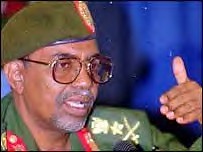
Sudanese President Omar al-Bashir in military uniform. The leader of this oil-rich African state has declared a ceasefire with Darfur rebel groups.
Originally uploaded by Pan-African News Wire File Photos
Al-Bashir was greeted by about 5,000 cheering supporters as he arrrived in El Fasher
Sudan's president has dismissed accusation that he is responsible for atrocities in Darfur, as he began a two-day tour of the troubled western region.
Omar al-Bashir, who faces a possible international arrest warrant for allegedly masterminding genocide in Darfur, will visit the three state capitals in the region - El Fasher in the north, Nyala in the south and El Geneina in the west.
"Yes, we all know that there have been problems in Darfur and we know that there have been injustices. But we, from day one, sought to bring peace for all the people of Darfur," al-Bashir said.
Luis Moreno-Ocampo, the prosecutor at the International Criminal Court, accuses al-Bashir of instructing his forces to annihilate three non-Arab groups in Darfur, masterminding murder, torture, pillaging and using rape to commit genocide.
But the Sudanese president said: "What Ocampo said about Darfur is lies ... We have to find a solution to the Darfur crisis.
"I came here to Darfur to say one thing. That every IDP [internally displaced person] must return back to their village and then the government must supply social services."
Security convoy
He arrived in El Fasher, the old capital of Darfur and headquarters for a poorly manned and equipped UN-led peacekeeping mission, in a convoy supported by a helicopter and security forces in vehicles mounted with machine guns.
Al-Bashir was greeted by about 5,000 cheering supporters, including civil servants, tribesmen, students, men on camels and horses.
They pledged allegiance and condemned the war crimes charges against him.
Al-Bashir danced to nationalist music, jabbing the air with his walking stick.
Sudanese officials refused to comment on the purpose or the timing of the Darfur tour, but analysts predicted the move was part of Sudan's intense diplomatic offensive to stave off potential ICC charges.
From El-Fasher, al-Bashir travelled proceed to Nyala where he inaugurated development projects and visited a water station.
He also accused France, where Abdel Wahid Mohammed Nur, one of the main Darfur rebel leaders lives in exile, of damaging peace efforts and ordered the release of 89 children arrested after an attack on the capital Khartoum.
"I order the authorities to release those children and take care of them and take care of their education," al-Bashir told another crowd of thousands of people.
He will fly on to El Geneina, not far from the Chadian border, on Thursday and returning to Khartoum.
President's hopes
Mohammed Adow, Al Jazeera's correspondent reporting from El Fasher, said al-Bashir hopes to achieve a lot with the visit.
"He is here to launch what he calls a new Sudan-led peace process, for the settlement of the Darfur conflict once and for all," Adow said.
"He is also here to oversee a process in which a thousand families who have been living in IDP camps are voluntarily returning home. They say they are confident enough to return home and the president will be [highlighting] that.
"He will also meet tribal leaders involved in the conflict here."
Members of those groups, the Fur, Masalit and Zaghawa, some of whom belong to al-Bashir's National Congress Party, are expected to be among those greeting him.
He is being accompanied on the trip by a number of government officials and journalists.
Western and Arab diplomats, including Alberto Fernandez, the US charge d'affaires, and Rosalind Marsden, the British ambassador, also accompanied al-Bashir on his tour.
"We're not sure what Beshir will be announcing, or if he'll be announcing anything, but if he does we should be there at the appropriate level," the British embassy told the AFP news agency.
"Of course it does not signify a change in our policy with regards to the ICC."
Thousands killed
The UN says that up to 300,000 people have died and more than 2.2 million have fled their homes since the conflict in Darfur erupted in February 2003. Sudan says 10,000 have been killed.
The war began when African ethnic minority rebels took up arms against the Arab-dominated Khartoum government and state-backed Arab militias, fighting for resources and power in one of the most remote and deprived places on earth.
Al-Bashir arrived in EL Fasher as the peacekeeping mission in Darfur announced that a UN security officer was undergoing hospital treatment after being beaten up by Sudanese government soldiers who forcibly took him to a military base.
The incident happened when the officer started taking pictures of a place in El Fasher market in order to investigate a road accident involving a UN staff member, a military vehicle and a taxi, the joint African Union-UN mission said.
No comments:
Post a Comment